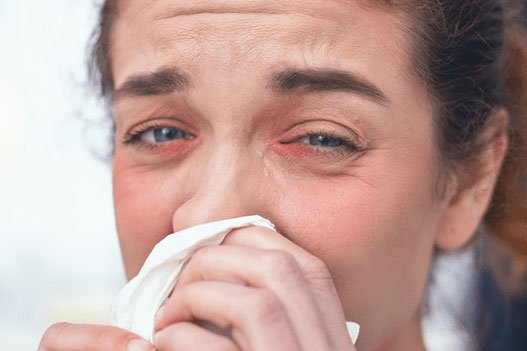Best Ways to Handle Eye Allergies
For some, it becomes more of a problem in the spring…for some, in the fall. And for some lucky folks, it happens all year round. Allergies are never a fun thing to deal with, but trying to handle allergy symptoms with your eyes can be difficult and cumbersome. We’ll chat about what causes allergy symptoms in your eyes, as well as providing some tips to get you to stop feeling like you need to rip your eyes out of your head when allergy season comes around.
What are Allergies, and Why Do I Feel This Way?
According to the American College of Allergy, Asthma, and Immunology, allergies are caused by an over-reaction from our immune system. When we come into contact with something that sets off our immune system, called an “allergen”, it triggers a response from something called mast cells. Mast cells are all over our body and hold a chemical called histamine, which when released causes A LOT of irritation! Most commonly people associate allergies with a runny nose, sneezing, and coughing.
When these mast cells in our eyes are activated by a particular allergen, such as pollen or animal dander, it can cause our eyes to become red, itchy, and watery.
Most people are able to recognize these symptoms and take a medication known as an anti-histamine, which helps to stop the release of histamine and therefore stops or significantly slows down the allergic reaction. These are commonly recognized medications – Benadryl, Zyrtec, Claritin, Allegra, and Xyzal are just a few of the common brands that can help with reducing allergic responses all over your body. But what if you are taking one of these medications already and your eyes STILL feel itchy and red? Time to send in reinforcements!
For Those Who Need the Extra Help
If you’re like me and your allergies mostly bother your eyes, sometimes a daily allergy pill isn’t going to completely fix your symptoms. Thankfully, there are some other options that can help to calm the itching and discomfort.
Over the Counter Allergy Eye Drops
This is a game changer for when your eyes are constantly itching, watering, and uncomfortable. Allergy eye drops can be found wherever you typically go shopping – Walmart, Target, CVS, Walgreens, and many other places. They’re typically found in the aisle with contact lens care items like solutions and cases. These medications are anti-histamines only for the surface of your eye, so it is a very targeted treatment. Like any medication, we want them to be patient specific. Come and visit Dr. Seim or Dr. Richardson to discuss which medication may be best for you!
Artificial Tears
Allergy medications tend to dry out the eye, which can be beneficial for those who have very watery eyes with their allergies. If your eyes don’t tend to water when your allergies are bothering you however, this can be annoying. Lubricating eye drops, also referred to as artificial tears, are a great source of relief for that dry and scratchy feeling. These will also be available near the contact lens care area in whatever stores you enjoy shopping in. There are many good quality products out there, so feel free to ask Dr. Seim or Dr. Richardson what their favorites are the next time you see us (we even have some that we sell right here in the office)!
For any eye drop, whether it’s specific for allergies or for lubrication, it is important to make sure the bottle does NOT say “get the red out”. These eye drops typically do not provide any relief for itching, discomfort, or dryness. They’re very good at making your eyes look not as red, but unfortunately that’s about it. If you’re unsure if yours fall into this category, reach out to our office.
Cool Compresses
Sometimes you need quick relief, or something else to help while the allergy eye drops kick in. That’s where a cool compress can help. Having a cool washcloth or a cooling eye mask on can help to calm down irritation quickly. In order for it to be most effective, the cooling should last consistently for about 5 minutes. This may mean that you need to re-freeze your cooling mask or rewet your cool washcloth. If you use an ice pack, make sure there is a towel wrapped around it! The skin around our eyes is very fragile, and an uncovered ice pack may be too much for that delicate skin.
What if None of Those Work?
While the 3 tools I already mentioned are very helpful, it may not fix the problem 100% of the way. Sometimes people may need special eye scrubs or wipes to help get rid of the material they’re allergic to off the front of their eyes. Occasionally, some people need prescription anti-inflammatory eye drops to completely resolve their symptoms. Every patient is different, so it’s important to know which option (or options) will work best for you. Ask about what you can do at your next yearly eye check up with Dr. Seim or Dr. Richardson!



